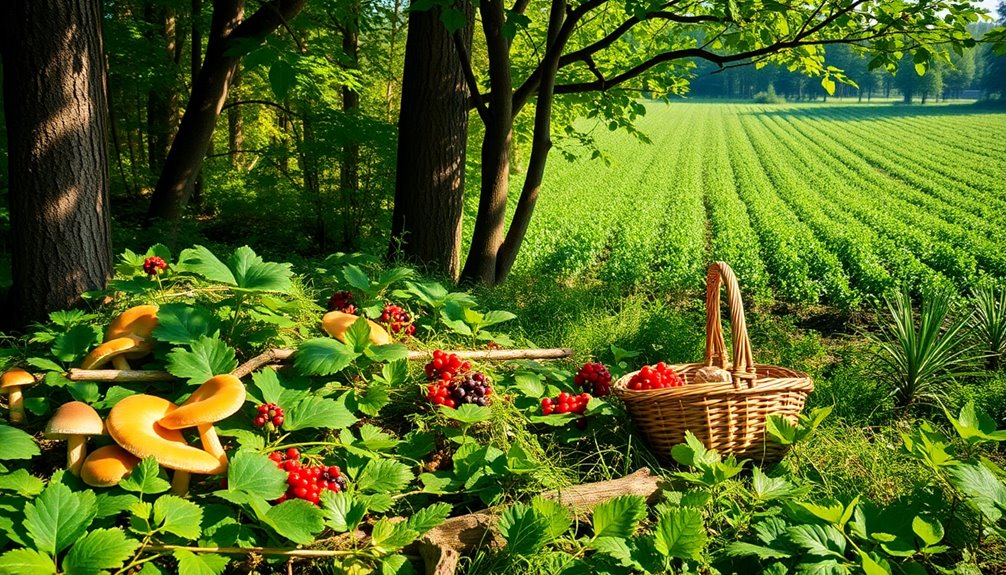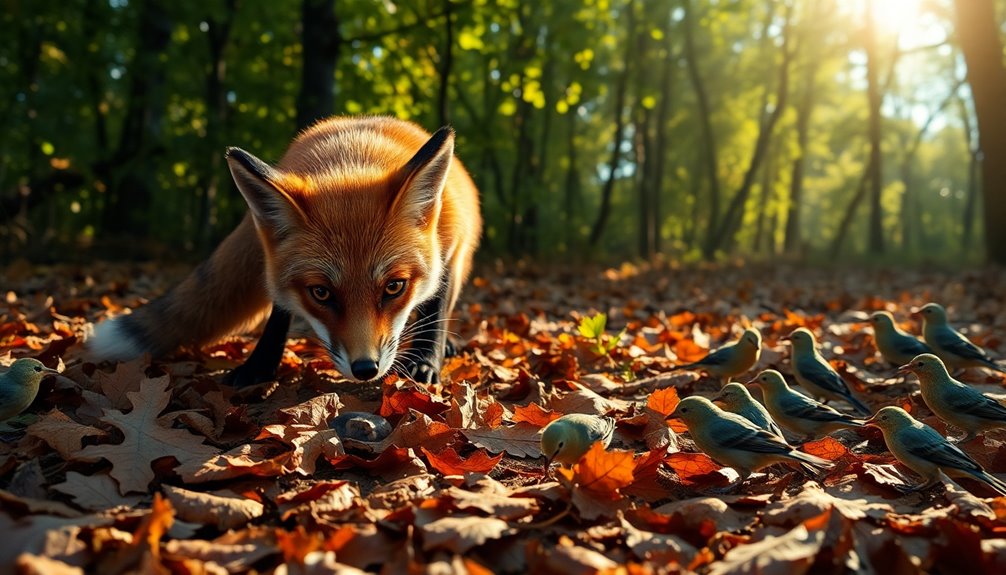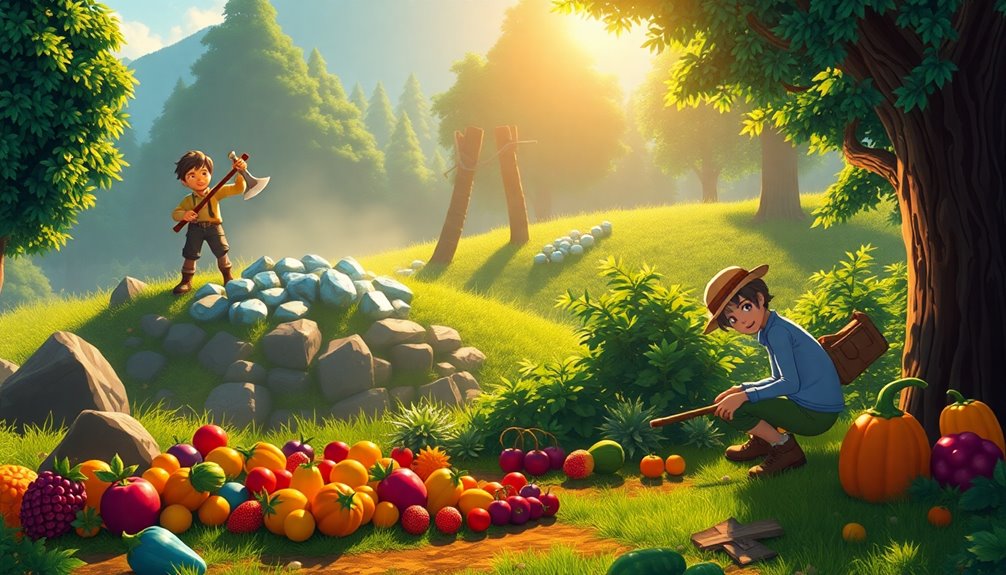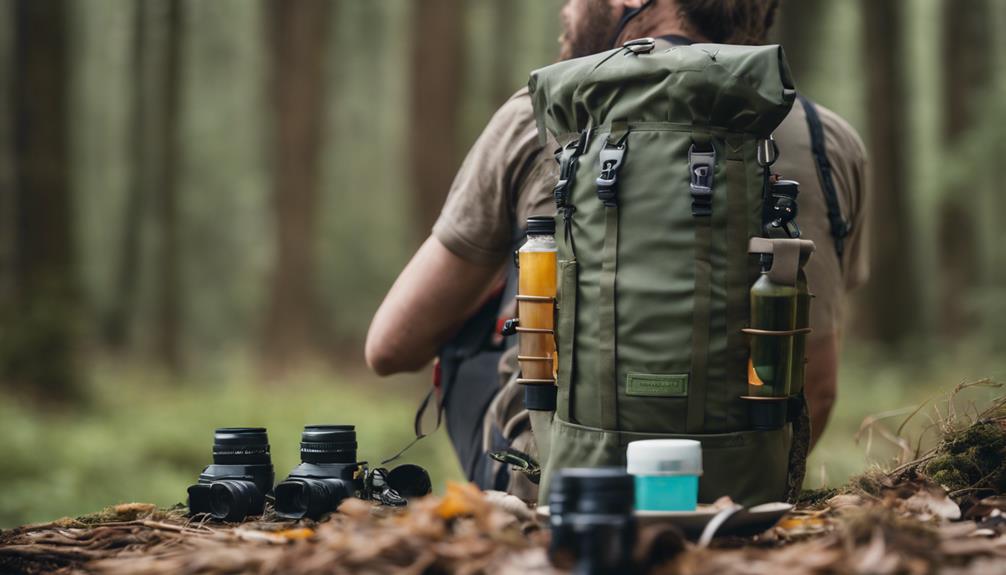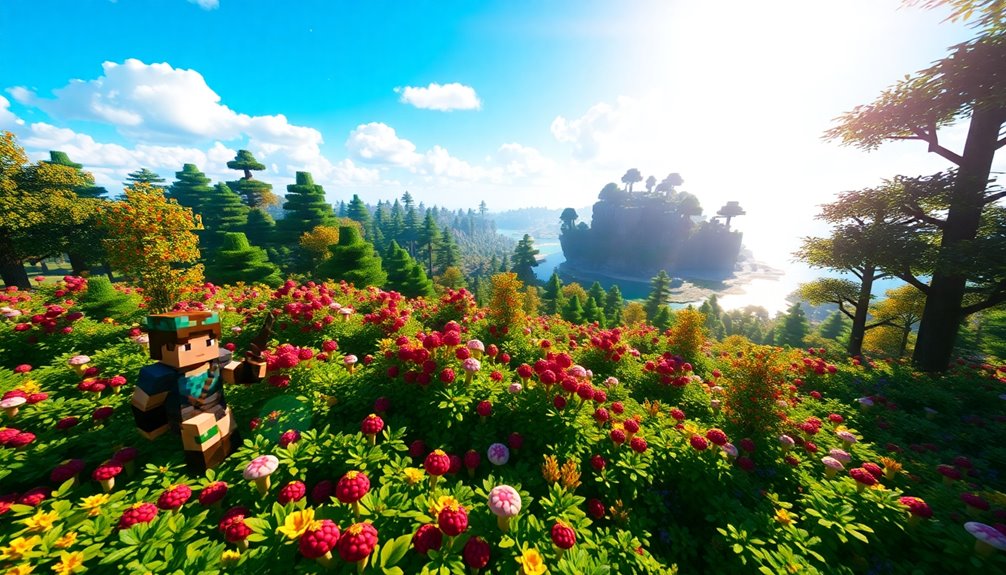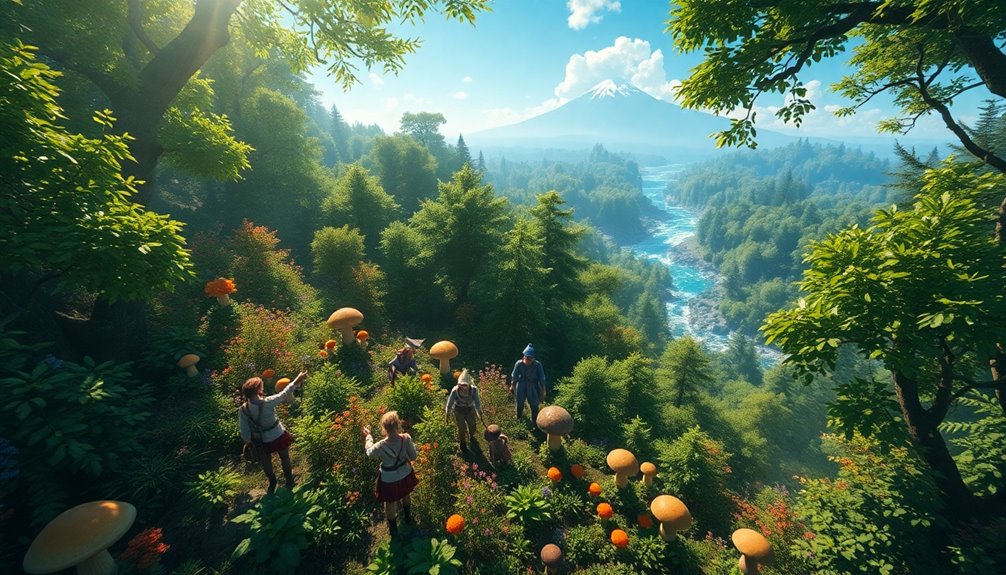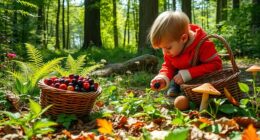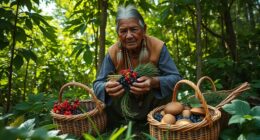Foraging's benefits often outshine farming, and for good reasons. It provides a diverse, nutrient-rich diet that can lower chronic disease rates considerably. You tap into wild foods that are higher in essential nutrients and lower in harmful chemicals. Additionally, foraging promotes sustainability by reducing environmental degradation and supporting biodiversity. It fosters cooperative community structures, unlike farming's often hierarchical systems. Plus, you can save money by foraging free food instead of buying expensive produce. There's so much more to uncover about this age-old practice and its relevance today—your exploration of foraging will certainly yield some surprising insights.
Key Takeaways
- Foraging promotes a diverse and nutrient-rich diet, leading to better health outcomes compared to the often monocultural diets of agricultural societies.
- Environmental impact is lower with foraging, as it avoids land conversion and supports ecosystem health through sustainable practices.
- Foraging fosters cooperative community dynamics, enhancing social cohesion and resilience, unlike the hierarchical structures often seen in farming societies.
- Reliance on foraged foods reduces grocery expenses, benefiting both individuals and local economies through sustainable practices and niche markets.
- Hunter-gatherers exhibit minimal chronic diseases, showcasing the nutritional advantages of foraging over agricultural lifestyles linked to malnutrition and health issues.
Historical Perspectives on Foraging

Have you ever wondered how our ancestors survived for millions of years before farming? Foraging was the primary subsistence strategy for over 1.8 million years, with hunter-gatherers thriving for 95% of human history. Nutritional studies show that these early communities enjoyed a diverse diet, which helped them maintain lower rates of chronic diseases compared to the early agricultural societies that relied heavily on staple crops.
The shift to farming around 12,000 years ago wasn't a universal boon; archaeological evidence reveals it was gradual and varied across different regions. While agriculture brought about class distinctions and inequalities, foraging societies were often characterized by egalitarian social structures with minimal hierarchies.
These hunter-gatherers exhibited remarkable resilience, adapting to changing resources through their mobility. Their ability to move in search of food allowed them to thrive in diverse environments, unlike the sedentary lifestyles that farming imposed, which often led to vulnerabilities.
In light of these historical perspectives, it's clear that foraging offered not just sustenance, but a way of life that fostered community, health, and adaptability long before the advent of agriculture.
Nutritional and Environmental Benefits

What if you could access a diet that not only nourishes but also supports the environment? Foraging offers just that. By embracing a diverse diet rich in wild edible plants, you can greatly enhance your nutritional quality. Raw food diets, which emphasize fresh, unprocessed ingredients, can also provide similar benefits when foraged.
Unlike agricultural societies, which often face health deficiencies from monoculture diets, foraging provides a variety of nutrients. Research shows that hunter-gatherers exhibited better overall health, with no signs of modern diseases. Additionally, foraging allows for the utilization of natural signs that can enhance your ability to locate food sources effectively.
Moreover, foraging promotes sustainable resource use. It requires minimal labor and has a lower environmental impact compared to conventional farming, which often leads to land degradation and biodiversity loss. By foraging responsibly, you can stimulate plant growth and help maintain ecosystems, counteracting the harmful effects of over-farming. In fact, regions like Wisconsin's Wild Bounty highlight the vast array of edible plants available that can enhance your foraging experience while promoting biodiversity.
In an age of increasing food shortages, knowing how to forage equips you with alternative food sources that are more resilient to pests and climate variations. This adaptability not only enhances your diet but also supports the environment, making you more self-reliant in times of need. Additionally, understanding food safety is crucial to prevent foodborne illnesses while foraging.
Social Structures and Community Impact
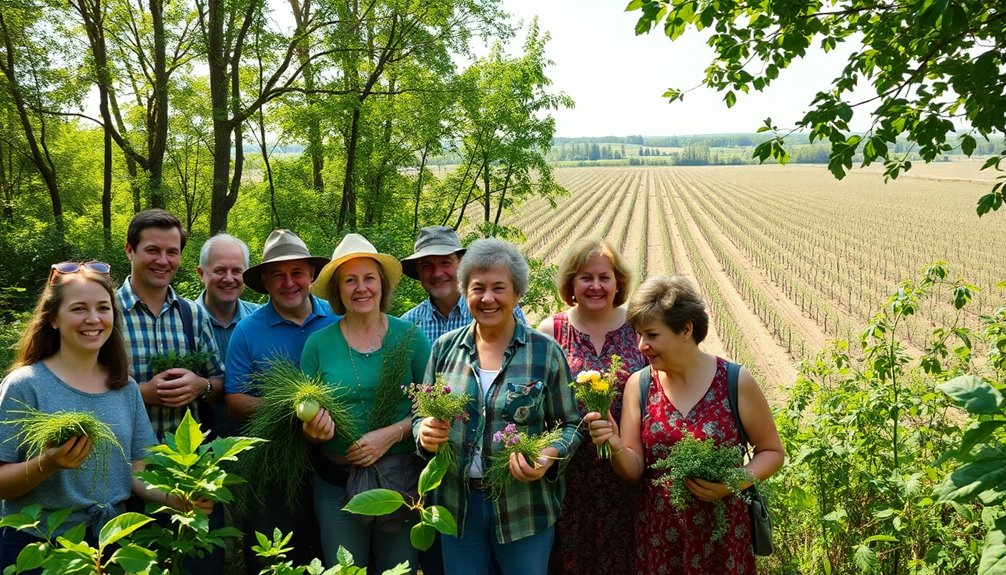
Social dynamics in foraging communities starkly contrast with those in agricultural societies. In foraging communities, you'll find egalitarian social structures that promote equal contribution from both men and women. This cooperative approach fosters community cohesion, allowing smaller groups to thrive without rigid hierarchies.
In contrast, agricultural societies often develop class divisions as wealth accumulation becomes concentrated among a few who control food surpluses.
Marshall Sahlins pointed out that hunter-gatherers, despite having few possessions, didn't experience poverty in the same way that emerged with the advent of civilization. This shift led to pronounced economic disparities, where certain individuals gained power while others faced exclusion.
Gender inequalities tend to worsen in agricultural settings, as established social roles restrict opportunities for women.
Historical events, like the Great Leap Forward, illustrate the vulnerabilities inherent in agrarian societies, where the benefits of wealth accumulation often favor elites at the expense of broader community welfare.
In foraging communities, however, the emphasis on cooperation nurtures social bonds, creating a more resilient and equitable environment for all members.
Drawbacks of Agricultural Practices
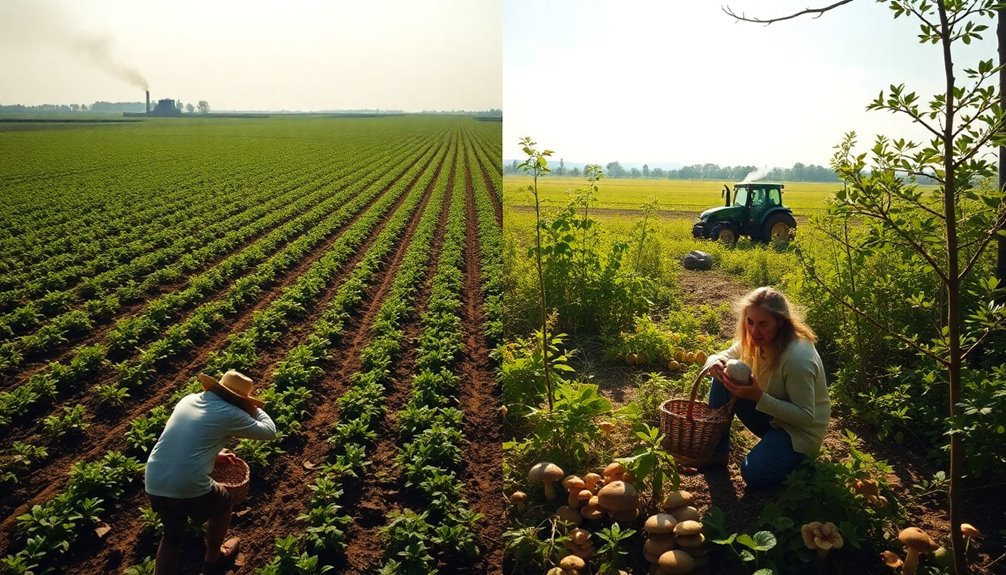
Agricultural practices come with significant drawbacks that impact both the environment and society. The reliance on farming often leads to environmental degradation, such as deforestation and soil depletion, threatening the sustainability of your food sources. Monoculture, or the cultivation of a single crop, increases vulnerability to pests and diseases, as seen in the Irish potato famine, which devastated populations due to crop failure.
Additionally, a sedentary lifestyle associated with agricultural practices can result in health issues. Early agricultural societies faced malnutrition and higher disease rates because of limited dietary diversity. This lack of variety in food can have long-term implications for your health and well-being.
Furthermore, agricultural practices contribute to societal stratification. The surplus food produced allows for class distinctions and wealth disparities, exacerbating social inequality. You might find that the labor-intensive nature of farming reduces your leisure time, leading to increased stress and a decline in your overall quality of life.
In contrast, foraging communities often experience a more balanced work-life dynamic, which supports better health and social cohesion.
Lessons From Foraging Today
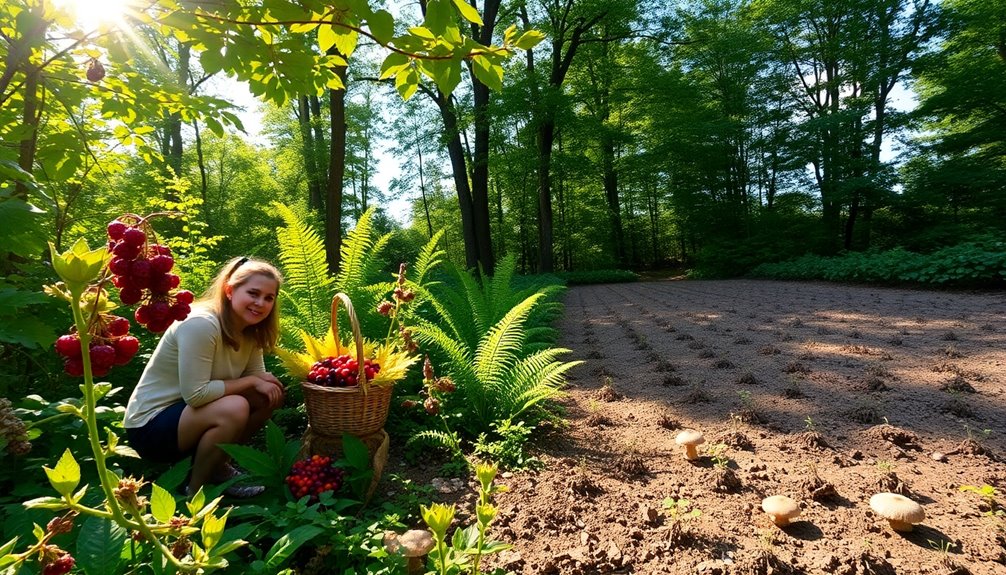
Shifting away from the drawbacks of farming, foraging offers valuable lessons that can enhance our relationship with food and the environment. By embracing foraging, you tap into dietary diversity, gaining access to a wide range of wild edible plants and animals that can improve your nutrition. Unlike the limited staple crops of agriculture, foraging allows you to experience nature's bounty. Regularly engaging in foraging can also help you understand common issues related to food sourcing and sustainability. Additionally, understanding tree relationships is vital for successful foraging and can lead to discovering more edible varieties. For example, recognizing the importance of plant health can guide foragers in selecting sustainable harvesting methods that benefit the ecosystem. Furthermore, foragers often develop a deep appreciation for nutritional balance as they learn to incorporate a variety of wild foods into their diets.
Engaging in responsible harvesting practices—only taking what you need—helps stimulate plant growth and promotes sustainability. This approach connects you to traditional ecological knowledge, as you learn to identify and gather local flora.
Foraging isn't just about food; it's a recreational activity that encourages outdoor exploration, enhancing your observation skills and appreciation for the natural world. Additionally, it fosters collaboration and teamwork as you often forage with friends or family, sharing knowledge and experiences.
The growing interest in foraging reflects a cultural shift towards valuing sustainable practices and reconnecting with ancient food traditions. By embracing this lifestyle, you empower your community while promoting biodiversity.
Frequently Asked Questions
Why Is Foraging Better Than Farming?
Foraging offers you a diverse diet packed with nutrients from various wild plants and animals, often surpassing what you'd find in limited agricultural crops.
It requires less labor, giving you more leisure time and reducing stress, which boosts your mental and physical health.
By practicing sustainable harvesting, you maintain a balanced relationship with nature, promoting biodiversity.
Plus, foraging fosters social equality and cooperation, contributing to a healthier, more connected community.
Why Did Humans Stop Foraging and Start Farming?
Humans stopped foraging and started farming primarily for the promise of food stability. As populations grew, the need for a reliable food source became essential.
You'd find that farming allowed communities to cultivate crops, leading to surpluses that supported larger groups. While foraging offered variety, it didn't guarantee enough food year-round.
This change marked a shift towards settled lifestyles, but it also introduced challenges like increased labor and social inequalities.
Why Was Hunting Better Than Farming?
Hunting offered you a diverse diet, rich in wild plants and animals, which kept you healthier and less prone to chronic diseases.
You worked less, only 12-19 hours a week, giving you plenty of leisure time for cultural activities.
Your social structures were often more egalitarian, fostering cooperation among your community.
Plus, your adaptability to changing environments guaranteed resilience against food shortages, unlike the rigid farming systems that could lead to scarcity and dependence.
Why Is Foraging Good?
Foraging's like uncovering a treasure chest of flavors and nutrients right in your backyard!
You get to enjoy an incredible variety of wild plants and animals, which can boost your health and keep chronic diseases at bay.
By practicing responsible foraging, you help protect the environment while connecting with ancient traditions.
Plus, you deepen your understanding of local ecosystems, making you more resilient to changes in nature.
It's an adventure waiting for you!
Conclusion
In the end, foraging offers a glimpse into a sustainable past that farming often overlooks. By embracing nature's bounty, you tap into a rich tapestry of nutrition and community that agriculture can sometimes fray. While farming has its merits, it can't match the harmony found in foraging. So, why not take a step back and explore the wild? After all, the roots of our survival lie not just in the soil, but in the world around us.

